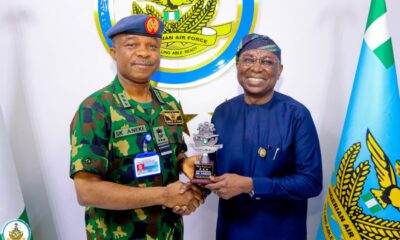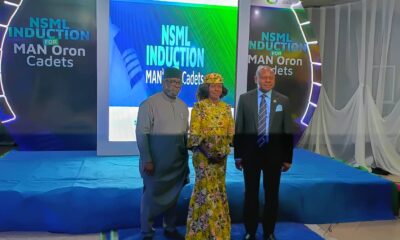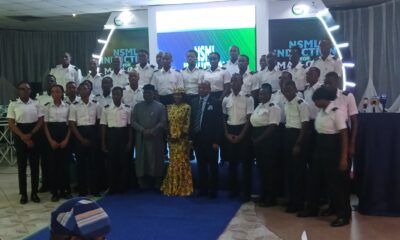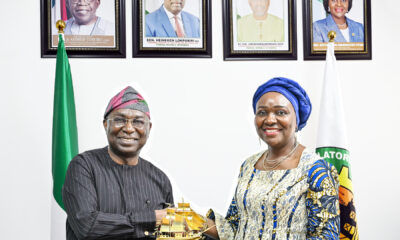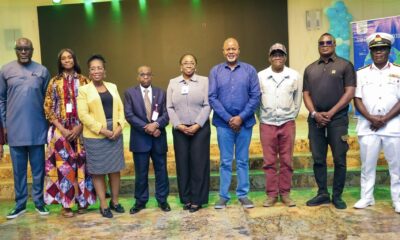Maritime
‘NSDP Not Channeled Through MAN Oron Is Waste of Resources’- Dr. Akabogu
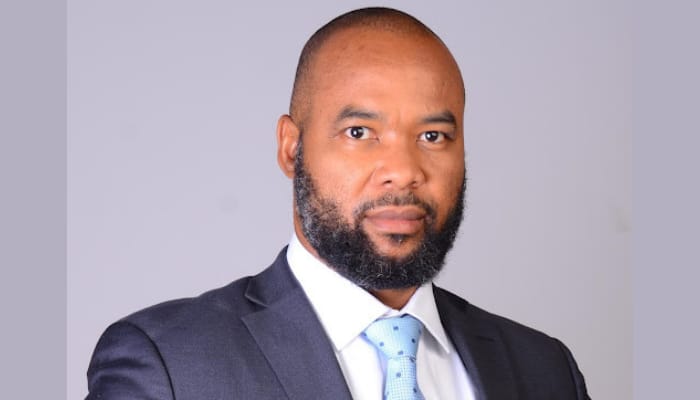
FUNMI ALUKO
Front row maritime law stakeholder, analyst and resource person, , Dr (Barrister) Emeka Akabogu has appealed to the federal government to immediately review its offshore training of Nigerian seafarers and cadets since such training can be effectively and efficiently undertaken by the Maritime Academy of Nigeria (MAN).
Speaking on the theme of the talkshop “Human Capital Development” Akabogu also revealed a worrisome trend in the nation’s shipping industry where according to him, the implementation of domestic shipping laws pander over vested interests as opposed to deliberate policy initiative designed to develop local capacity.
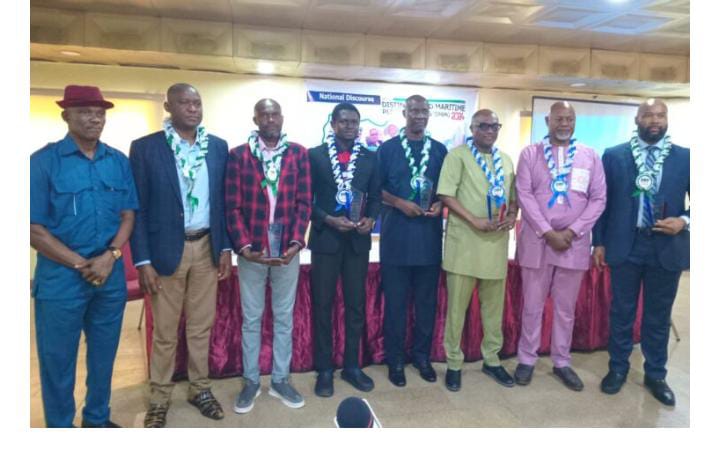
Akabogu, extreme right, with other stakeholders at the event in a group photograph
Akabogu who was speaking at the annual One-Day Maritime National Discussion organized by Maritime Insiders Newspaper in Lagos on Thursday lamented that at further training of cadets overseas is not only a misplaced priority but sheer waste of scarce resources.
He explained that a time the Nigerian Maritime Administration and Safety Agency (NIMASA) is having challenges in keeping cadets under the National Seafarers Development Programme (NSDP) in selected maritime institutions in Asia and Europe, the logical resort should be to scrap the overseas clause and let MAN Oron which has already attained the international maritime organization (IMO) carry on with the training; noting it holds lots of advantages including conserving foreign exchange that will be burnt pursuing the foreign trainings which holds no better training or certification than what is available locally.
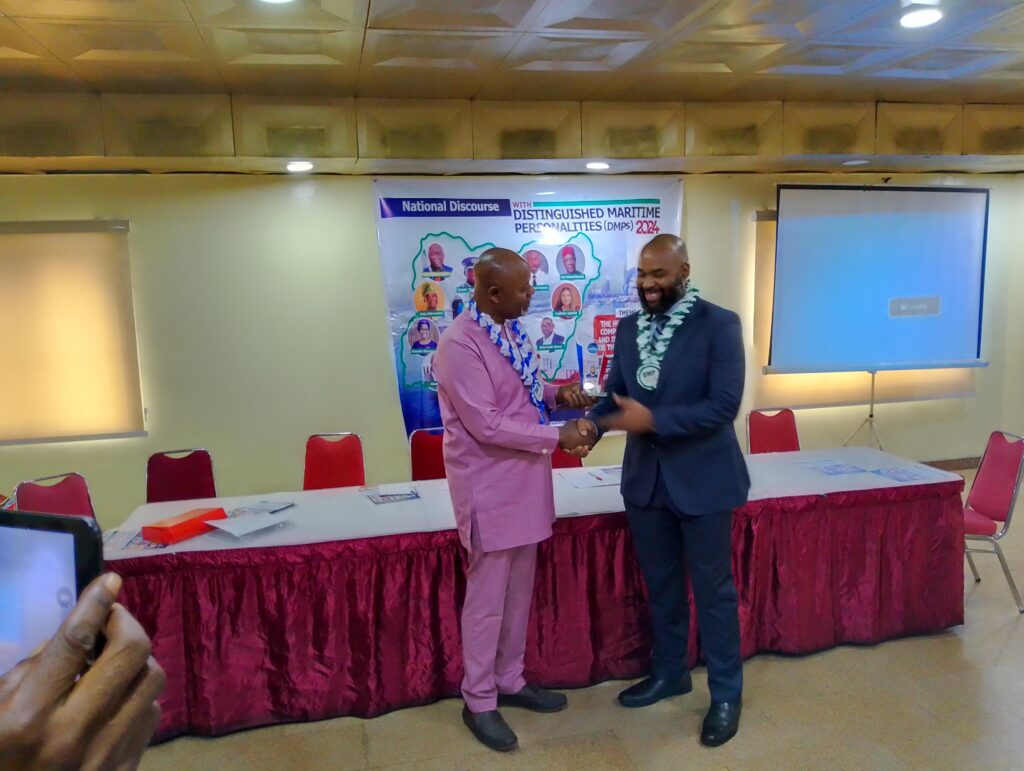
Akabogu receiving his Distinguished Maritime Personality Award from Engr. Greg Ogbeifun
Dr. Akabogu said that as integral part of the Nigerian shipping industry, it is about time MAN Oron is accorded its rightful status in national planning, declaring that the Academy is at par with any of its international counterparts, whether in terms of training facilities, academic manpower, competence and cadets welfare among other considerations.
“Our responsibility is to harness what we have and for the shipping industry the challenge and the opportunity really, is to harness what we have. But to do this the human capital is so essential, and the experiences of those who have been there and those presently there is a lot to take home.
“At the Maritime Academy of Nigeria (MAN) Oron, Nigeria, having visited there about three weeks ago l realized that…you see, when we send out people from Nigeria to different parts of the world, and we have them stranded sometimes, we’re actually wasting resources because the gentleman at the Maritime Academy of Nigeria (MAN) Oron have put in place the structure which is comparable to any first class maritime academy anywhere in the world.
“And I don’t see any reason why the Nigerian Seafaring Development Program (NSDP) by NIMASA should operate without channeling trainee cadets to that academy. That academy will meet the requirements of whatever the students are getting anywhere else they go in the world.”
Continuing, the respected maritime legal practitioner also faulted the regime of severe demands imposed on indigenous ship owners as against the lenient and more relaxed requirements offered foreign operators, which he said has continued to undermine local shipping content and growth; even as the Nigerian shipping space remains dominated by foreigners; resulting in unwarranted trade imbalance, loss of jobs and loss of profits to foreign interests.

“So one of the things l will advise the government through NIMASA to do is to channel the placements of cadets under the NSDP through MAN Oron. It will save us a lot of foreign exchange and it will give the students the required skills which they need in that regard.”
On the indiscriminate administration of policy waivers on shipping trade in Nigeria as it relates to the absence of a national carrier, the maritime lawyer said:
“With regards to national carrier implication, again, as I said earlier, the laws of Nigeria already have put in place everything which is required to ensure that we achieve what we want to achieve. We have a Cabotage Law…the Cabotage Law for all its imperfections is still enough to enable us empower Nigerians. You have the NIMASA Act, but even for want of perfection again, it provides for national carrier status for deserving companies and organizations.
“And there are many who are deserving, but what have we found? We found that the implementation of these laws is anchored on vested interests as opposed to merit. And as long as…not even federal character, if it was federal character that will be good, but when there are vested interests where ensuring that value arising from the law is delivered is based on as quick proposed as opposed to merit, then we’ve got a challenge; and we need to appreciate that.”
He argued that whereas the duty of government is to build the sovereign commonwealth, what successive administration and the current one has done is to promote foreign interests over and above Nigerian interest; especially in the failure to encourage local participants in the shipping trade to pass through harsh operating environment.
He explained that failure to grant those with the wherewithal a carrier status by holding back approval is a national disservice by all definition of the words.
“So we have enough within the extant laws, the national status requirements simply require that if the company is a Nigerian company, in fact, 60% Nigeria is registered in Nigeria, and is running in Nigeria and is interested in moving deep sea, that that company to the extent of its compliance with the requirements should be given National Career status, it is very simple, very straightforward.
“But the challenges which we find are challenges relating to ship acquisitions as indicated, challenges relating to cargo assurance. These are the two challenges, the ship acquisition, and the cargo assurance. You said that if one has the ideas, one should be able to access cargo, in an ideal Nigeria that will be the scenario, but we’ve had experiences of people who have some ideas, who have some money but who…all they require is that the regulatory environment is steady, is ascertainable, and is implemented in line with what is required.’
“But the regulatory environment is never that way, so as stakeholders, what do I think that we should be doing? Government is important to the extent of that regulatory environment and for all the efforts which we make as ship owners, as operators, as industry stakeholders, the government’s regulatory environment, if it is absent, or if it is suboptimal, then all our efforts will be vain because you need government to assure you that when your ship gets into the port, for instance, that the process for the client of that ship is seamless, and that you don’t have to pay out of pocket or under the table for things which normally should be done; to be done.
“It is a regulatory issue, you need government to listen to the cries when we say that the same requirements which we post on our foreign ship owners should be granted to Nigerian ship owners, because over the years we’ve been talking about tonnage tax as opposed to the tax regime which we have today. If we are dealing with tonnage tax, where actually everybody is operating on the same level, then you’ll see that you will be encouraged.”
He further argued that the harsh operating environment suffered by indigenous ship owners will continue to create artificial lack of capacity as stakeholders would rather fly their ships on foreign flags.
“I dare assert today that it does not pay any Nigerian to fly his vessel in Nigeria. It’s a fact, and from a business point of view, you are shooting yourself in the foot if you acquire a ship and you want to register it in Nigeria and to comply fully with Nigerian laws with regard to Cabotage for instance. It pays you better to flag the ship outside Nigeria and it operates as a foreign ship, you acquire all the waivers which are available there for you to have because, again, the process for the implementation of the waivers is not rigorous.
“Any foreigner is able to get any waiver with regard to any ship in today’s Nigeria. So again, there’s so much to be said but I think it’s important that we begin to think along the lines of optimizing the value as I said, which we have, and in optimizing value to develop the maritime industry, not on vested interests but from the root.”

